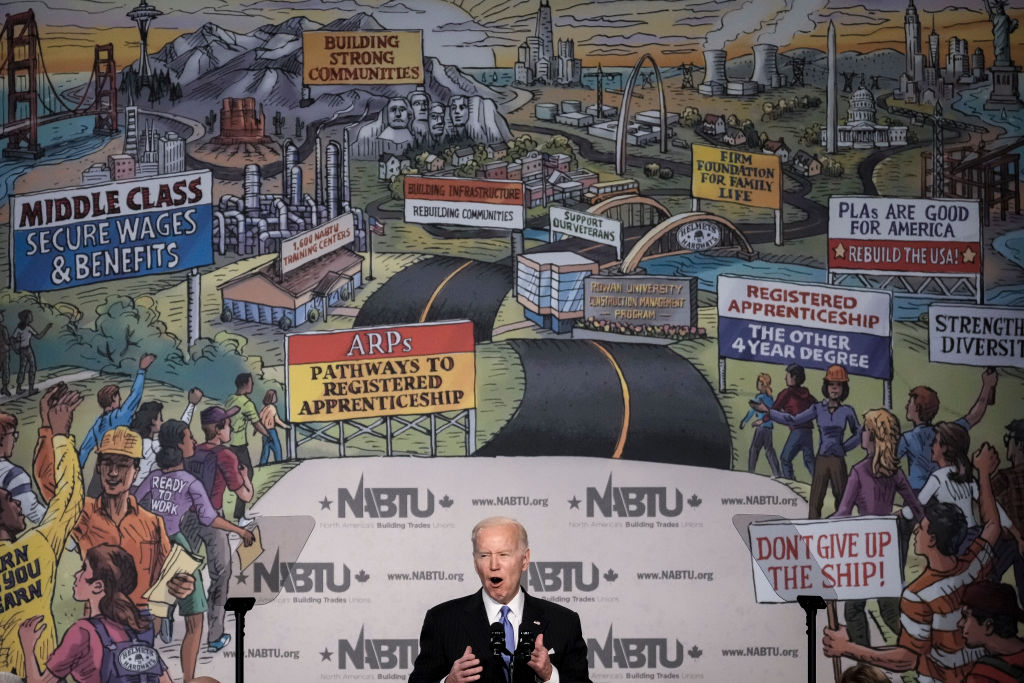Beyond Neoliberalism
Robert Kuttner on What Biden Gets Right and How to Beat Today’s High-Tech Royalists
“We just don’t have the luxury to be despondent.”

In 1936 at the Democratic Convention in Philadelphia, Franklin Delano Roosevelt told a cheering crowd that the only way to redeem the country from the Great Depression was by defeating the “economic royalists” who controlled the economy and sought “control over government itself.” In his new book Going Big: FDR’s Legacy, Biden’s New Deal, and the Struggle to Save Democracy, historian and co-founder of the American Prospect magazine Robert Kuttner explains why President Joe Biden needs to be even bolder economically than FDR to preserve our democracy.
By focusing on pocketbook issues and fighting our current financial, corporate and technological royalists, Kuttner believes that Democrats can galvanize activists and break through to at least some working-class voters who have embraced the Republican culture wars. He also discussed how Democrats who are not supportive of women’s reproductive rights deserve to be challenged. He spoke to Capital & Main from his home in Boston.
Note: This interview has been edited for length and clarity.
Capital & Main: The original New Deal embodied the idea that we share a common economic fate as a nation. How has that idea evolved through the decades?
Robert Kuttner: Republicans always opposed the New Deal. Democrats, beginning with Bill Clinton, split into a neoliberal wing and a progressive labor wing. The congressional branch of the Democratic Party, which is more of the labor wing, continues to believe in a shared fate. At the presidential level of the party, beginning with Clinton and Treasury Secretary Robert Rubin, they looked more to Wall Street. This was kind of a Democratic Party version of trickle-down economics. Obviously, it didn’t work.
In your book you imagine driving from Washington state to Pennsylvania in the 1970s. Along the way you would have found Democratic senators in Idaho (Frank Church), Montana (Mike Mansfield), Indiana (Birch Bayh), Oklahoma (Fred Harris), South Dakota (George McGovern). Jon Tester is currently a Democrat from Montana, but what happened to transform those other states into solid Republican territory?
The New Deal was very much involved in the development of the West. There was a lot of public capital invested: great dams, reclamation projects and public investments. Rural people who lived in the West often saw Democrats as their party. More importantly, you had strong unions. In those years in order to get the Democratic nomination in the north, you had to be a labor Democrat. I think the weakening of the labor movement over time is a big part of why Democrats stopped being able to elect senators in those states.
Less than the What’s the Matter With Kansas cultural issues such as religion, abortion, guns or gay marriage?
It wasn’t just cultural issues crowding out economic ones, it was Democrats ceasing to deliver on economic programs. So it wasn’t that people were fooled between their cultural sensibilities and their pocketbook interests. It’s that the Democrats weren’t delivering on the pocketbook front, either.
“If you want to defend the rights of people to choose their own bathrooms based on their definition of gender, you had damn well better deliver for the working class or you’re not going to be entrusted to do either thing.”
This is partly an assessment of Democratic presidents Truman, Johnson, Carter, Clinton and Obama. What struck me was the insecurity, sometimes with respect to economics and at other times foreign policy, that you portray throughout.
Johnson absolutely had confidence on civil rights and on economics because those were issues that he knew personally. His insecurity about not wanting to be a president who lost the war caused him to trust experts who led him into a catastrophe.
Clinton got lucky with an incredibly weak opponent in Robert Dole. I call Clinton Typhoid Mary. He survives and everybody else gets sick. Democrats get wiped out in the 1994 midterm and then he started playing footsie with Newt Gingrich, moving to the center-right on welfare reform, and he manages to get reelected. He doesn’t get his signature health care program through and he has to compromise on his budget. I don’t think history is going to judge Clinton as a successful president.
Obama is an extremely talented, brilliant guy but also gets incredibly lucky in that in September of the election year the economy collapses. He could have differentiated himself from the Republicans and said, “Well, this is what happens when you deregulate capitalism.” Instead, he hires the old team of people who deregulated Wall Street and he bails out the banks. In 2010, Democrats suffer an even worse blowout than they suffered in 1994. All you can say about these guys is that they got reelected. That doesn’t mean they had successful presidencies.
You write that “if Democrats expect to be avant garde on social and cultural issues, they have to deliver for the working class on economic ones.” What are the avant garde issues?
LGBTQ rights. If you want to defend the rights of people to choose their own bathrooms based on their definition of gender, you had damn well better deliver for the working class or you’re not going to be entrusted to do either thing. Hillary Clinton is exhibit A here. Hillary thought that she could get in bed with Wall Street with half-a-million-dollar speaking fees, continue to double down on neoliberalism and corporate globalism, but be a feminist and really progressive on LGBTQ rights. It doesn’t compute. She didn’t even carry the women’s vote.
Democrats live or die based on the credibility that working people have in them. And working people did not believe in Hillary Clinton. There are issues like fighting racism, and like defending LGBTQ rights and defending reproductive rights, where you are going to lose some working-class people unless you more than make up for it by being foursquare an economic populist. Sen. Sherrod Brown (D-Ohio) gets elected in a state that mostly elects Republicans. He is terrific on race, terrific on LGBTQ rights and doesn’t lose the white working class because they know he’s on their side.
“To say that anybody who teaches the standard history of race in America is brainwashing our kids is bullshit. Republicans resort to these tactics because if they debate the real issues they lose.”
I suspect that many people will object to placing the struggle against racism into the category of avant garde.
I don’t mean avant garde as a pejorative. It’s an issue where a mainstream politician has to push the envelope and take people to places where they’re a little bit uncomfortable. That’s the whole history of the gay rights movement.
Look at Johnson and civil rights. Johnson built a ton of political capital because his opponent in 1964 was Barry Goldwater. He had Medicare and these other social programs that were broadly helpful to people so he spent some of that political capital working with Dr. King on civil rights. I’m not using avant garde as a pejorative.
Some of the economic concepts you write about can be complicated: the Glass Steagall Act, misuse of investment pools, collateralized debt obligations. Meanwhile, Republicans are talking about emotionally polarizing and galvanizing issues that drive their base voters, like critical race theory and “grooming” children sexually. How do progressives compete with that politically?
In Going Big, I mainly write about defending incomes, defending the ability to have debt-free higher education, defending the ability for working people to buy a home. I think you can do pocketbook populism in a way that anybody can understand.
Republicans are going to try and smear Democrats by taking what is standard history about the role of race in American history, going back to slavery. This isn’t critical race theory, it’s standard American history. To say that anybody who teaches the standard history of race in America is brainwashing our kids is bullshit. Michigan state Sen. Mallory McMorrow recently delivered an incredibly powerful speech, making the point that Republicans resort to these tactics because if they debate the real issues they lose. You have to push back. You just can’t let them get away with stirring up hatred.
There are elements within the Democratic Party who want to focus on un-electing so-called moderate Democrats, replacing them with progressives. Others want to focus on holding the seats they have and flipping Republican seats. Where do you come down on this?
Democrats are going to have primary fights. For instance, Congressman Henry Cuellar in Texas is the only Democrat who did not vote for the September 2021 bill to codify abortion rights. He’s being challenged by a progressive. Progressive groups have sent letters to Nancy Pelosi asking, “Do you still support this guy after what happened with the Supreme Court draft decision being leaked?” So, Cuellar could lose in his primary.
You’ve had a couple of other recent primaries where centrist business Democrats in progressive districts were challenged and the progressive won the seat. That’s OK, as long as you restrict that strategy to the primary season. In the general election, given that the stakes are whether we descend into fascism or not, everybody should be supporting the Democrat.
“If we don’t hold Congress, and if Biden or some other Democrat doesn’t get reelected in 2024, our democracy is hanging by a thread. It’s weaker than it’s been since the Civil War.”
You praise Biden in the book as a president whose soul is a combination of Bernie Sanders and Elizabeth Warren. What has he done right?
His policies towards labor have been very strong. Many of his appointments have been superb, and he has mostly avoided falling back on the same Wall Street crowd that hobbled prior Democratic presidencies. There’s still a tremendous corporate undertow, which is why we’ve got to keep the pressure on Biden to be true to his Roosevelt impulses.
I think the reason Biden moved more left was partly because the party had moved more left and because neoliberalism had been a political failure. He also wanted to differentiate himself from Obama. Biden has turned out to be more progressive than a lot of people thought he would be. The problem is that unlike Roosevelt and LBJ, he doesn’t have a working majority in Congress. So, you have to do what Truman did. You keep planting the flag, putting forward the program that you would enact if you had the vote, and you keep fighting for it.
Historian Sheri Berman has written that “political development is best understood as a marathon and not a sprint.” In Europe, fascism and Nazism flourished partly due to the brittle foundations of democracy. Is it possible to conclude that we simply haven’t solidified our democratic institutions yet?
I think democracy could very easily go down the drain. Most Republicans now put getting elected ahead of defending democracy. We saw the attempted coup d’état of January 2020, with most of the Republicans in Congress defending it. We saw all manner of voter suppression that exceeds any previous kind of voter suppression.
If we don’t hold Congress, and if Biden or some other Democrat doesn’t get reelected in 2024, our democracy is hanging by a thread. It’s weaker than it’s been since the Civil War. That’s just terrifying, and it’s what gets me up in the morning. That’s why I have no patience with Democrats who are saying that “Biden’s not everything I hoped he would be,” and “I’m not going to work hard for the ticket.” I mean, Christ, this is the future of whether this country is going to be a democracy at all. We just don’t have the luxury to be despondent. We have to get out and organize.
You write that “Biden’s vision needs to be even more radical” than FDR’s. What would that look like?
I think a lot of stuff needs to be socialized. If you look at things that have been privatized, they are not only less equitable but less efficient. There is no reason why broadband shouldn’t be socially owned. Electric power should be socially owned. We need to reconstitute social housing in this country. We need much stronger labor laws. We need much tougher antitrust enforcement, and really go after the platform monopolies. And we need to just make it clear that the corporate pillaging of working people has got to stop. Most of all the financial sector needs to be reined in. If Biden doesn’t have the votes to enact that now, he should at least put forward the program.
Fifty years from now, how are historians going to describe the underlying dynamics of our time that have led to political disruption and disorder?
I’ll hazard a guess. There was a period, which lasted about 35 years, when we had a strong government with strong democratic institutions and strong labor unions. Labor essentially fought capital to a draw. When labor unions were weakened and Reagan, Carter and Clinton started dismantling the regulatory state, capital just ran roughshod.
When you let capital escape any kind of containment, capital tries to turn everything into a commodity. Then ordinary people get very upset, and they’re willing to vote for neofascists. That’s my 30 second history of the past 50 years.
Copyright 2022 Capital & Main

-

 Latest NewsFebruary 3, 2026
Latest NewsFebruary 3, 2026Amid the Violent Minnesota Raids, ICE Arrests Over 100 Refugees, Ships Many to Texas
-

 Featured VideoFebruary 4, 2026
Featured VideoFebruary 4, 2026Protesters Turn to Economic Disruption to Fight ICE
-

 Column - State of InequalityFebruary 5, 2026
Column - State of InequalityFebruary 5, 2026Lawsuits Push Back on Trump’s Attack on Child Care
-

 Column - California UncoveredFebruary 6, 2026
Column - California UncoveredFebruary 6, 2026What It’s Like On the Front Line as Health Care Cuts Start to Hit
-

 The SlickFebruary 10, 2026
The SlickFebruary 10, 2026New Mexico Again Debates Greenhouse Gas Reductions as Snow Melts
-

 Latest NewsFebruary 12, 2026
Latest NewsFebruary 12, 2026Trump Administration ‘Wanted to Use Us as a Trophy,’ Says School Board Member Arrested Over Church Protest
-

 Latest NewsFebruary 10, 2026
Latest NewsFebruary 10, 2026Louisiana Bets Big on ‘Blue Ammonia.’ Communities Along Cancer Alley Brace for the Cost.
-

 Column - State of InequalityFebruary 12, 2026
Column - State of InequalityFebruary 12, 2026They’re Organizing to Stop the Next Assault on Immigrant Families

